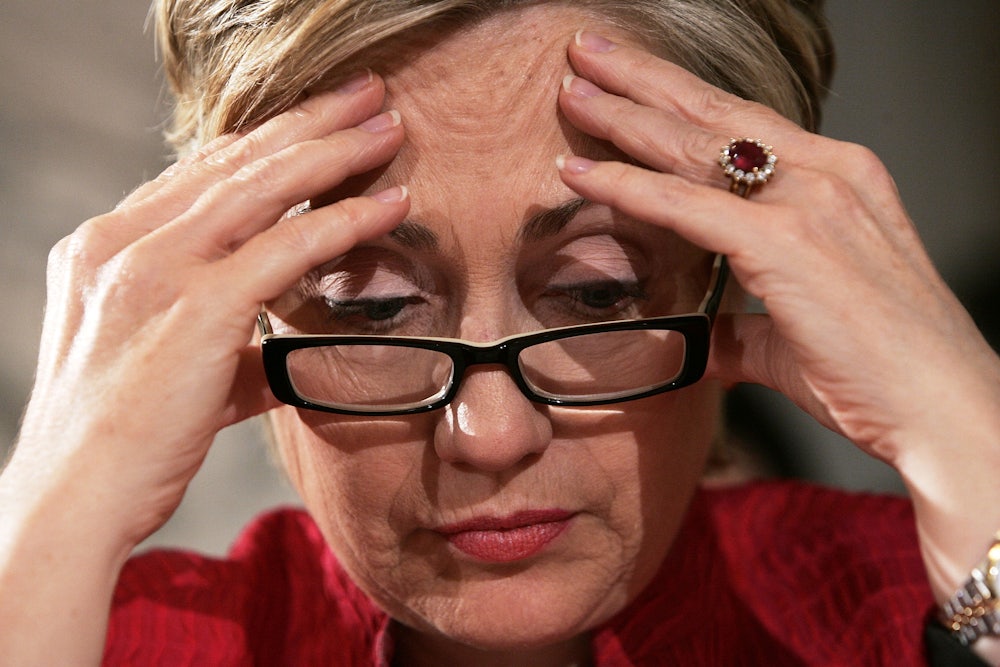If you divide the world of liberal politics into two groups of people—those prone to panic and those who are sanguine about the coming election—you’ll hear two different stories about the state of the Democratic primary.
Former Harry Reid aide Jim Manley spoke for the former group when he told CNN, “I am increasingly concerned that even if Senator [Bernie] Sanders would come around and support a [Hillary] Clinton nomination that things become so polarized that not all of the supporters would agree to do so. I am afraid he has made this internal debate so polarized that even if he comes around, far too many of his supporters would just be so disgusted with the process that they won’t come out in the numbers needed.”
The Washington Post’s Greg Sargent, in contrast, thinks the panickers should stop panicking, because this is all normal for a late-stage Democratic primary, and Clinton’s actually doing fairly well. “According to this one metric, at least, the percentage of Clinton’s supporters in 2008 who seemed prepared to bolt was marginally larger than the percentage of Sanders supporters who now say the same,” Sargent notes. “Meanwhile, in today’s poll, Clinton is viewed favorably by 62 percent of Democrats. But in April of 2008, Barack Obama was viewed favorably by only 57 percent of Democrats—again, worse.”
These two groups interpret narrowing general election polls along similar lines. Nervous liberals see Clinton in a precarious position thanks to Sanders’s refusal to drop out and endorse her; unflappable liberals believe the polls will narrow quickly once the Democratic race is officially decided, again citing the 2008 election as a historical precedent.
For the time being, I align myself with the latter set, but would caution both that the path to party unity will be less straightforward this year than it was in 2008. Three differences in particular will make the process trickier now than it was before, offset by three forces that will help bridge the party divide.
Here are the three main sources of contention:
1. Ideology
The 2008 primary was far more acrimonious than this year’s primary has been, which is odd in hindsight because Clinton and Obama were running on nearly identical domestic policy platforms. That is not the case this year. Sanders’s economic agenda is more ambitious than Clinton’s: more closely aligned with progressive ideals; less preemptively constrained by political pragmatism. Compounding this particular difference, Democrats in 2008 nominated the candidate who had been opposed to the Iraq War from the outset, and who best represented the foreign policy sensibilities of the Democratic base. This year, the situation is reversed. Few Clinton supporters found Obama’s foreign policy instincts difficult to swallow, whereas Sanders supporters will be asked to support a candidate whose foreign policy judgment they do not trust. Unity will require more substantive concessions from Clinton than Obama ever had to make, and for Sanders supporters to make peace with a relatively incremental agenda.
2. Leadership
Obama and Clinton made somewhat different cases for their own candidacies. Obama ran (incorrectly, it turns out) as a uniquely gifted uniter, who could heal partisan wounds. Clinton ran as a worker and a fighter who could notch progressive victories through her mastery of politics. The difference seems significant, until you compare it to today’s primary where Clinton is making a very similar pitch, and Sanders is promising a political revolution powerful enough to drive big money and corruption out of politics and bring social democracy to America. If that appeals to you then the presidency Clinton promises—one that would represent many of the ills Sanders has run against—will sound horribly uninspiring by contrast.
3. Change
In 2008, liberals were reeling from eight humiliating years of Republican rule, and the country at large was desperate for real change. For Democrats who saw Obama as a deeply disappointing second choice, he was still far preferable to four or eight more years of indignity.
Fortunately, Democrats will benefit from three countervailing pressures.
1. Identity
As an African American and a female respectively, both Obama and Clinton promised historic presidencies. To some extent this may have made Democratic unity in 2008 easier than it would have been if, say, Obama were white. Likewise, if Sanders had defeated Clinton this year, liberals excited by the prospect of electing the country’s first female president would have been sorely disappointed. But Clinton is going to win the Democratic primary, and as the only candidate capable of breaking the male-dominated mold of the presidency, her victory will provide a distinct appeal to many Democratic voters who supported Sanders for ideological reasons.
2. Barack Obama
Most Clinton voters say they would happily vote for Sanders, and most Sanders voters say they would happily vote for Clinton. But what Democratic voters really want is to be able to vote for Obama again. He is far and away the most popular Democrat in America; recent opinion polls show him clearing 50 percent approval ratings, and 10 points above water. He will be Clinton’s most vocal and effective surrogate. And his signature accomplishments will be on the line.
3. Donald Trump
Even if Obama’s approval ratings mask a certain degree of Democratic Party fatigue in the broader electorate, there’s no denying that the country is less hungry for change now than it was eight years ago. To overcome that, Republicans were going to need to nominate an Obama of their own—someone capable of flirting with 60 percent favorability, the way candidate Obama did. Instead, they nominated Trump, who is poised to be the most despised major party nominee of all time. If the thought of another term or two in the political wilderness was enough to convince PUMAs to fall in line for Obama, the thought of a Trump presidency will bring most hardened Sanders voters back home to Clinton.
